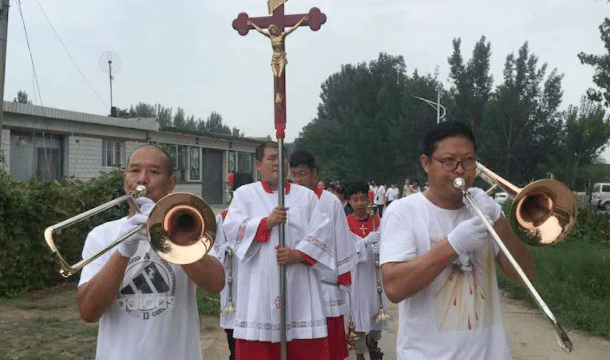
HONG KONG (UCAN): Hundreds of Catholics from the unofficial Church in Shenyang, Liaoning province, China were unable to celebrate the feast of the Assumption on August 15 because most churches were closed. Officials said the closures were part of efforts avoid large gatherings to check the spread of the Covid-19 coronavirus (SARS-CoV-2).
A few churches were opened but police beefed up patrols to restrict the number of people gathering in them, local Catholics said.
However, priests from the unofficial community celebrated Masses for smaller groups in homes, helping parishioners meet the requirements of the day of obligation.
Teresa Jia said her mother attended Mass the night before the feast day at a parishioner’s home.
“The priest held Masses in several places, each with about 10 people,” she said, adding, “Things are better in Shenyang, where there are no conflicts between the unofficial and official Churches. The government more severely suppresses the unofficial ones.”
Although most public places, including movie halls, remain open, churches are yet to open in most parts of China.
Jia, who also attends Masses in the state-sanctioned churches, noted that during the epidemic, “the government has tightened the restrictions on official churches too. So I don’t go often.”
Local governments in northern China shut down churches of unofficial communities soon after the pandemic began to spread early this year, purportedly to control the virus. China currently has some 90,205 cases of infection.
Paul Lu, a sacristan in a northern Chinese church, said his parish was closed because of the pandemic. He also said the local government has been forcing priests of his parish to join the official Church. “If he fails (to do so), they threaten to shut down the church,” he said.
The government closed his parish church after the August 9 Sunday Mass and did not allow it to open it on the feast of the Assumption on grounds of epidemic control. “This is obviously the government (compelling) the priest to join the Chinese Catholic Patriotic Association,” he said.
Lu is holding discussions with priests and parish presidents about how to communicate with the government. He fears that once the church is closed, it will be taken over and they will never be allowed to open again.
John Li, an parishioner with the unofficial Church in Anhui province, said authorities had shut down several churches, citing the pandemic, but that those with the official community could celebrate Masses. “So we had to go to a church of the official community to participate in the liturgy,” he said.
He said their church was closed but opened for the Mass of the Assumption, but that officials stood at the door, limiting the number of people entering .
The government has placed strict restrictions on people attending services, such as temperature checks, registration of personal information and a ban on children—even the official Church.
Jacob Zhang, president of a parish church in Hebei province, said that on the feast of the Assumption, authorities allowed only 50 people to attend Mass. However, several priests took turns to celebrate seven Masses through the day until evening. “But even then, many people were not able to attend,” he said.









